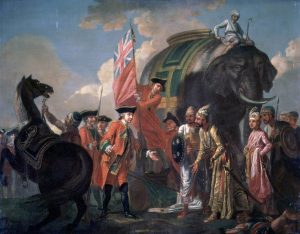Pax Britannica – The Zenith of the British Empire

To protect their power and interest, the British elite needed to extend their influence beyond the boundaries of the United Kingdom. This, in previous centuries and to some degree in the present time, has led them to direct domination of foreign lands. In this article an illustration will be given of how the political elite has sought to secure British power and interests in the countries that she directly or indirectly ruled.
The Theory of State Expansionism
The tendency to expand, or the principle of growth, may characterize all social organism. This may also be put as the propensity of states to expand; that is, to enlarge their physical selves, their territory, or their overseas interests or their influence beyond their own borders. It is a characteristic which has played a dominant role in the history of international relations. “Every great country, wrote an Italian historian, every active people naturally tends to expand.”1 If the state does not develop it will stagnate or die. In a developing state, there is population growth, the social structure and the economy become more complex over time, the trade internally and externally becomes more diversified and voluminous. These developments increase the sum of the claims or interests which governments have to promote and defend in the international system, and yet often without any conscious or formulated desire for that increase. In addition to the interest of individuals in foreign trade, the defence of foreign markets and investments in fact become national interests because they are sources of income and economic security for many more besides the actual traders and investors. Developing interests which are blocked in one area try to find an outlet in another. To this impulse which is as a result of physical growth of the state and the contacts brought about because of that growth, the name ‘imperialism’ has been given, though in the period since the First World War that word has become in negative connotations and its value as an academic concept has come to be questioned. According to F.S. Northedge, the need to expand or imperialism (in this context) is an “acquisitive capacity of man, a permanent inclination of human nature, and evidence for this is certainly all about us, both in the contemporary world and in the records of the past. When we make the seemingly innocuous statement, which is normally made without question in modern industrialized society, that if taxes are raised too high, the incentive to work will be reduced, we are in effect taking it for granted that men will not do what they have no inclination to do, unless their acquisitive interests (we call them such) are thereby satisfied. Moreover, appeals to the citizen’s sense of civic duty will not, we assume, act as a sufficient incentive to work unless there is some cash benefit, and perhaps the promise of more cash benefit in the future.”2



